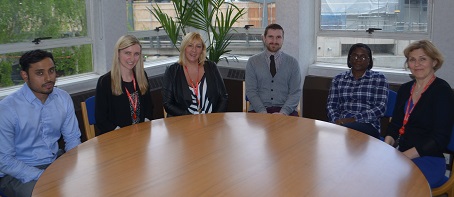This weeks guest blog comes courtesy of Culture at Kings, who tell us about some of the great initiatives they have been carrying out over the last few months as well as their upcoming sustainability plans.
“If you know where to look, you can find many great green initiatives at King’s. There’s an Urban Garden Project, a Cycling Club and there’s even talk of having a bee hive on the roof of the Strand building. It’s fantastic to see how many people across the University are concerned with the environment and we at Culture at King’s wanted to be a part of that of course, so we signed up to the Sustainability Champions scheme with a team of six.
We worked through our workbook and ticked the boxes for a greener office: printing double-sided, wearing jumpers instead of turning up the heating, drinking Fairtrade tea, and shutting down equipment that’s not in use. But soon we started to change things in our personal routines as well. We realised we were eating less meat, we wouldn’t buy products with excessive wrapping, at least two of us have a 4-minute-shower-challenge timer, and we started bringing spare fruit and veg into the office to share with colleagues to reduce our food waste.
 Stella Toonen signed up to receiving a bagful of organic vegetables every week, an initiative run by PhD student Roger Hallam in the CMCI department to offer an alternative to buying groceries from supermarkets. Yvonne Castle attended a Bee Hotel Workshop led by Urban Bees, a free event which was part of the Northbank Festival. She made a little bamboo hotel for solitary bees and learnt lots about the different types of bees pollinating London flora. And Kate Dunton helped out at her local organic community allotment and planted bee-friendly flowering herbs in her own garden.
Stella Toonen signed up to receiving a bagful of organic vegetables every week, an initiative run by PhD student Roger Hallam in the CMCI department to offer an alternative to buying groceries from supermarkets. Yvonne Castle attended a Bee Hotel Workshop led by Urban Bees, a free event which was part of the Northbank Festival. She made a little bamboo hotel for solitary bees and learnt lots about the different types of bees pollinating London flora. And Kate Dunton helped out at her local organic community allotment and planted bee-friendly flowering herbs in her own garden.
So with all the support we received from colleagues we decided we could take it a bit further and started organising bigger awareness initiatives. We set up an ‘Air Con Free Fridays’ pilot in the office for July and August, which is going very well. And we’re planning to organise a ‘Buy British Week’, in which we encourage staff to buy products grown close to home and celebrate their achievements with a picnic on the last day of the week.
It looks like we’ve got exciting ‘green’ things coming up, and (perhaps subconsciously) our work across King’s also seems to include some great initiatives too. Our Science Gallery London team at Guy’s campus has been promoting the benefits of eating insects through our Fed Up season about food, and as part of our Cultural Institute’s Utopia 2016 season we’re already having great conversations with artists about visualising a perfectly sustainable world. As Sustainability Champions we’d like to think we had something to do with it.”




 ithin Fit for King’s there are multiple ways in which it links to sustainability. Firstly each team (Estates teams for example Capital House or Guy’s estates team), produce a termly plan which address PPP: people, processes and premises. Each team come up with one thing that they are going to do in order to improve each of these Ps. Last term, Guy’s Estates work on premises saw the addition of the new recycle bins within Guy’s Quad. This term, Capital House team are looking at removing all under desk bins and improving signage for recycling.
ithin Fit for King’s there are multiple ways in which it links to sustainability. Firstly each team (Estates teams for example Capital House or Guy’s estates team), produce a termly plan which address PPP: people, processes and premises. Each team come up with one thing that they are going to do in order to improve each of these Ps. Last term, Guy’s Estates work on premises saw the addition of the new recycle bins within Guy’s Quad. This term, Capital House team are looking at removing all under desk bins and improving signage for recycling.

 Over the next few weeks we are meeting various members of different teams within Estates and Facilities. Each week we’ll be asking the team what they do and how they are linked to sustainability at King’s. For our first week we meet Alison and Debbie from the Service Desk.
Over the next few weeks we are meeting various members of different teams within Estates and Facilities. Each week we’ll be asking the team what they do and how they are linked to sustainability at King’s. For our first week we meet Alison and Debbie from the Service Desk.
